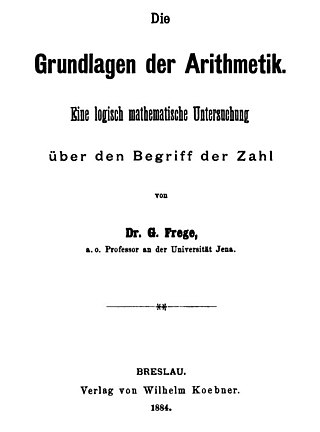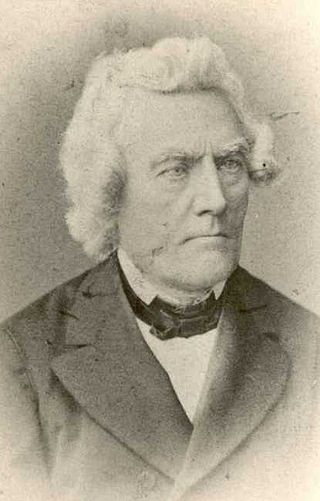Related Research Articles

Friedrich Ludwig Gottlob Frege was a German philosopher, logician, and mathematician. He was a mathematics professor at the University of Jena, and is understood by many to be the father of analytic philosophy, concentrating on the philosophy of language, logic, and mathematics. Though he was largely ignored during his lifetime, Giuseppe Peano (1858–1932), Bertrand Russell (1872–1970), and, to some extent, Ludwig Wittgenstein (1889–1951) introduced his work to later generations of philosophers. Frege is widely considered to be the greatest logician since Aristotle, and one of the most profound philosophers of mathematics ever.

Rudolf Carnap was a German-language philosopher who was active in Europe before 1935 and in the United States thereafter. He was a major member of the Vienna Circle and an advocate of logical positivism.

Ernst Alfred Cassirer was a German philosopher. Trained within the Neo-Kantian Marburg School, he initially followed his mentor Hermann Cohen in attempting to supply an idealistic philosophy of science.

In late modern continental philosophy, neo-Kantianism was a revival of the 18th-century philosophy of Immanuel Kant. The neo-Kantians sought to develop and clarify Kant's theories, particularly his concept of the thing-in-itself and his moral philosophy.

Wilhelm Windelband was a German philosopher of the Baden School.

Heinrich John Rickert was a German philosopher, one of the leading neo-Kantians.
Hans D. Sluga is a German philosopher who spent most of his career as professor of philosophy at the University of California, Berkeley. Sluga teaches and writes on topics in the history of analytic philosophy, the history of continental philosophy, as well as on political theory, and ancient philosophy in Greece and China. He has been particularly influenced by the thought of Gottlob Frege, Ludwig Wittgenstein, Martin Heidegger, Friedrich Nietzsche, and Michel Foucault.

Kaarlo Jaakko Juhani Hintikka was a Finnish philosopher and logician. Hintikka is regarded as the founder of formal epistemic logic and of game semantics for logic.

Otto Liebmann was a German neo-Kantian philosopher.
James Ferguson Conant is an American philosopher at the University of Chicago who has written extensively on topics in philosophy of language, ethics, and metaphilosophy. He is perhaps best known for his writings on Wittgenstein, and his association with the New Wittgenstein school of Wittgenstein interpretation initiated by Cora Diamond.
Richard Hönigswald was a well-known philosopher belonging to the wider circle of neo-Kantianism.
In metalogic and metamathematics, Frege's theorem is a metatheorem that states that the Peano axioms of arithmetic can be derived in second-order logic from Hume's principle. It was first proven, informally, by Gottlob Frege in his 1884 Die Grundlagen der Arithmetik and proven more formally in his 1893 Grundgesetze der Arithmetik I. The theorem was re-discovered by Crispin Wright in the early 1980s and has since been the focus of significant work. It is at the core of the philosophy of mathematics known as neo-logicism.

The Foundations of Arithmetic is a book by Gottlob Frege, published in 1884, which investigates the philosophical foundations of arithmetic. Frege refutes other idealist and materialist theories of number and develops his own platonist theory of numbers. The Grundlagen also helped to motivate Frege's later works in logicism.
David Andrew Bell is a British philosopher. He is emeritus professor of philosophy at the University of Sheffield, He studied in Dublin, Göttingen and Canada, and is best known for his work on the philosophers Gottlob Frege, Immanuel Kant, and Edmund Husserl, and also on topics such as solipsism, phenomenology, the theory of thought and judgement, and the history of the Analytic Tradition.
In the philosophy of mathematics, formalism is the view that holds that statements of mathematics and logic can be considered to be statements about the consequences of the manipulation of strings using established manipulation rules. A central idea of formalism "is that mathematics is not a body of propositions representing an abstract sector of reality, but is much more akin to a game, bringing with it no more commitment to an ontology of objects or properties than ludo or chess." According to formalism, the truths expressed in logic and mathematics are not about numbers, sets, or triangles or any other coextensive subject matter — in fact, they aren't "about" anything at all. Rather, mathematical statements are syntactic forms whose shapes and locations have no meaning unless they are given an interpretation. In contrast to mathematical realism, logicism, or intuitionism, formalism's contours are less defined due to broad approaches that can be categorized as formalist.
Michael Friedman is an American philosopher who serves as Suppes Professor of Philosophy of Science and Professor, by courtesy, of German Studies at Stanford University. Friedman is best known for his work in the philosophy of science, especially on scientific explanation and the philosophy of physics, and for his historical work on Immanuel Kant. Friedman has done historical work on figures in continental philosophy such as Martin Heidegger and Ernst Cassirer. He also serves as the co-director of the Program in History and Philosophy of Science and Technology at Stanford University.
Emil Lask was a German philosopher. A student of Heinrich Rickert at Freiburg University, he was a member of the Southwestern school of neo-Kantianism.

Moritz Wilhelm Drobisch was a German mathematician, logician, psychologist and philosopher. His brother was the composer Karl Ludwig Drobisch (1803–1854).
Thomas Mormann is Professor of Philosophy at the University of the Basque Country in Donostia-San Sebastian, Spain. He obtained his PhD in Mathematics from the University of Dortmund (1978). He obtained his Habilitation from the University of Munich. He works in the philosophy of science, formal ontology, structuralism, Carnap studies, and neo-Kantianism.
Wolfgang Cramer was a German philosopher and mathematician.
References
- Meyer, Regina and Schenk, Günter (eds.). 2001.Neukantianisch orientierte Philosophen. Crok media Verlag. ISBN 3-936228-01-9.
- Keller, Erich. 1928. Bruno Bauch als Philosoph des vaterländischen Gedankens, Hermann Beyer & Söhne, Langensalza.
- Keller, Erich. 1935. Die Philosophie Bruno Bauchs als Ausdruck germanischer Geisteshaltung, Kohlhammer Verlag. Stuttgart.
- Schmidt, Raymund (ed.). 1929. Die deutsche Philosophie der Gegenwart in Selbstdarstellungen, Verlag F. Meiner. Leipzig 1929.